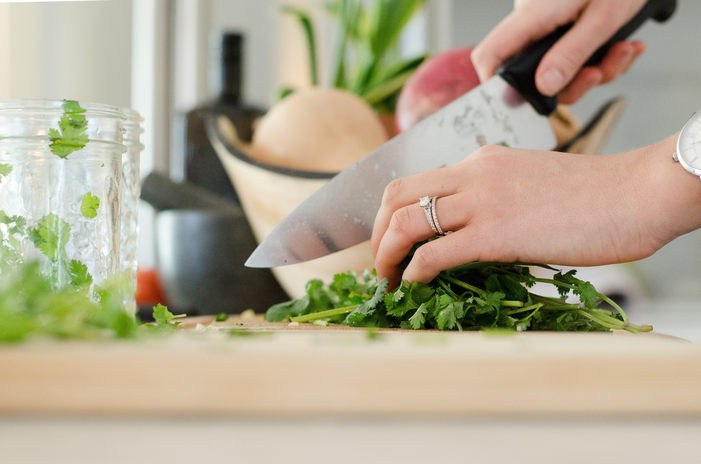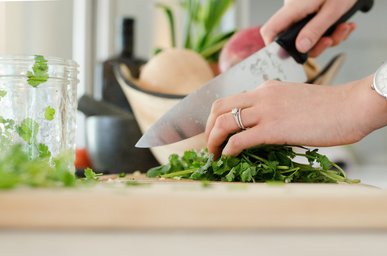When I was getting ready to head off to college, preparing my own meals seemed the furthest thing from a potential issue in lieu of “how am I going to fit all my clothes in those tiny closets?” and “that much for one textbook?” Dorm life put off that transition for a while longer, but once I got an apartment off campus and decided to completely forgo a meal plan there was a lot of “well, shoot, what do I do now?” Let me tell you, living off the same 3 pasta meals for 2 weeks straight is the furthest thing from fun or a healthy diet. It took me a while to get my feet under me in the kitchen and learn my way around a grocery store without my mom directing me, but once I did, it helped me feel much better and more secure in my place in the adult world.
Thanks, Mom, for giving me advice and keeping me from eating the same 5 things day in and day out (and for your help for this article. Hi Mom!).
Meal prepping might seem like a lot of planning ahead that maybe you don’t have time to do, whether it be school, work, internships, laundry, or the thousands of other thins that keep you busy a day. It’s not so hard, though, once you establish a routine.
I usually spend some time on Sunday afternoons planning out my meals for the week (and I write them in my planner so I don’t get confused), and then make my list for my weekly grocery trips early on Monday afternoons (avoiding grocery rush hour, of course). One thing I’ve discovered is that it’s important to stick to your schedule, because while it might seem obvious, “oh, yeah, I’ll eat that leftover chicken for lunch tomorrow,” once you’re in the swing of things during the week little things can slip your mind, and before you know it your leftovers went bad, you skipped out on a good meal, and you potentially wasted food.
When it comes to planning your meals, you don’t have to make anything big or fancy. When I first started trying to prep my own meals, I was thinking of my mom who almost always had 4 to 5 different options on the table for dinner every night, and how in the world am I going to do that? Don’t jump right in, start small! Take your favorite pasta dish and google some recipe variations. It’s something easy that you’re still used to, and the small changes can make a world of difference in taste, so you don’t feel like you’re eating the same thing over, and over, and over again. And for me, the thrill of trying a new recipe always gets me excited to be in the kitchen.
Another thing to consider is foods that could work with different meals. One of my favorite things to cook is chicken, because you can buy a big pack and make it all, and then it keeps for several days after (not too long, stick to your schedule!). For example, I’ll make all the chicken one night by simply coating it in breadcrumps and throwing it in the oven, and then eat it that night with some pasta. By planning ahead and picking up some lettuce at the store, I can then use the leftovers to make a salad (or two, depending on how big your salads are, and how much lettuce you buy). That’s a good three meals, at least, and four if you do more pasta a couple days later with a different sauce for a different flavor. One thing I love about chicken is that it’s so versatile, it’s the cheapest meat, it works with lots of different sides, and it lasts! I make sure to pick some up every week.
Another good idea is to make things in bulk. This, of course, doesn’t mean “make as much as you physically can.” It’ll take a bit of getting used to when it comes to figuring out just how much you eat in one meal and trying to eyeball it when it comes to making more, but eventually you should be able to figure out how many vegetables you should cut up to last you three meals, or how much chicken to cook to get you through part of the week. Reheating your food is easy, and it saves a lot of time and work when you’re in the middle of a busy week.
Here are a few of my favorite meal ideas that last a few days: Chicken (as I already mentioned, this can go well with pasta and a variety of salads), tacos (the meat lasts, and you can do traditional tacos, use the meat in a quesadilla, or even in another salad), lasagna (or any other major pasta dish), and homemade pizza (which is actually a lot of fun to make, and I usually buy premade dough so it’s a quick and easy prep).
Again, it all comes down to planning ahead. Once you’re used to the process and you have some ideas in your head for what to make per week, it doesn’t tke very long and then food preparation will be a very easy, non-stressful process as you make your way through the week. This leaves you with more time to focus on other things while keeping you feeling healthy, energetic, and motivated to work. It’s also a great way to experiment with cooking and hone your skills into being able to create bigger and better dishes. By planning in advance and cooking meals, you’re not only able to keep the right nutrients in your body, but you’re able to save money (I’m looking at the correlation between my bank account and Postmates as I write this. We all do it.). Hopefully it will be able to take a little more stress out of your life, beceause cooking should be fun and enjoyable, even with its importance because eating is a necessity, after all. Like my dietician says, food should be 80% about nutrition and 20% about fun. Happy cooking!


